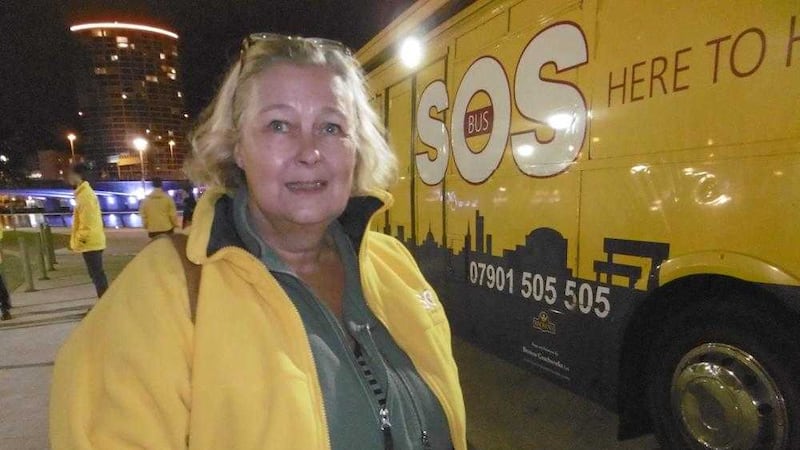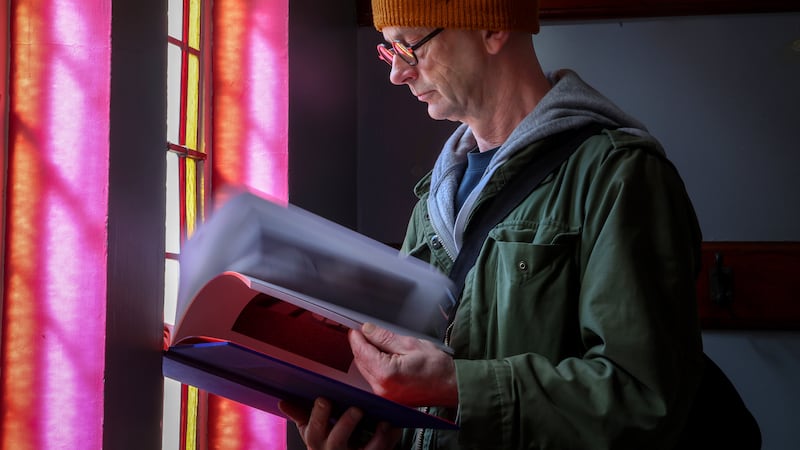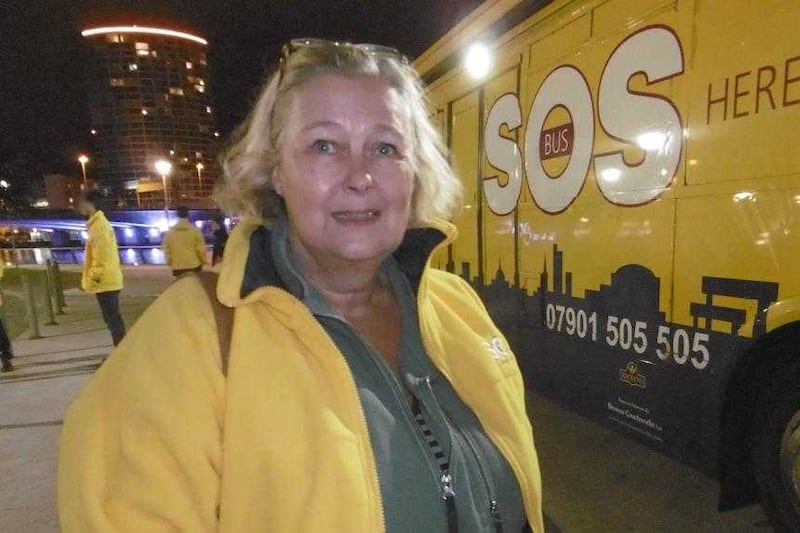WHERE else would she be except on the front line helping people in distress? The SOS bus parked at SSE arena seems like a million miles from Uganda but the ethos is the same – someone needs help and Linda McClelland is on hand.
It was there that I saw the vital service this charity offers to children, young people and adults throughout the city; a cup of tea, a pancake and a place of refuge.
On that Saturday night at the SSE (still widely known in Belfast and beyond as 'the Odyssey') ,it was mainly teenagers, young women in the skimpiest of dresses, many boys and girls who had just finished school, waiting for exam results, most the worse for alcohol – some had mixed it with drugs – so vulnerable yet there's no help within the clubs and pubs when they get into this state. And that's the importance of the SOS Bus and those special people on board.
Like the dozen trained volunteers, one by one Linda took these clubbers into the bus and talked, encouraged, reassured and held a bucket for those who had to be sick. I'll revisit this bus and talk some more about it but every parent who cares should ask their sons and daughters to put the emergency telephone number into their phones – 07901 505 505.
When they are lost for help, there's advice and understanding at the other end.
Until her retirement earlier this year, Linda was chief executive with War On Want NI, with most of her overseas work being in Uganda. Africa holds a special place in her heart and she has made a difference among the townships where life expectancy is so low.
In north east Uganda war meant people fleeing to make-do camps, living hand to mouth, bringing up children and burying their dead; people from all sections of society, the poorest to professional men and women. all displaced and all needing urgent help.
Linda talks of one couple with five children; she was a teacher, he a professor and they needed money for life-saving drugs for their son.
"They sold all they owned, even her wedding ring. Eventually he said to his wife, 'Go down to the barracks and do what you have to do. With drugs it will be five years before he dies, if we don't get the drugs the child will die in five days.'"
What a decision for a couple to make. She did sell her body and got enough money for the drugs but although the child lived, both she and her husband became infected with HIV.
In Uganda there was a dependence culture, with NGO and government handouts. She found a lot of gambling and drinking, nothing else to do and a way to forget the problems; so she and her War on Want colleagues set up small projects to grow crops and make a sustainable living.
Because of disease there were many widows and orphaned children, women in rags and bare feet, listless and ill, treated like scum, with people loath to associate with them.
"War on Want found these families and helped them. It took time but eventually they were able to kept bees, for instance, and sold the honey, staff taught them how to set up and manage bank accounts and eventually the women began to take control of their lives, growing crops and learning to market them."
Children went to school, some went on to study at university and it's with obvious pride that Linda talked of Harriet, a young girl who rose to a position of deputy chief executive officer with the government.
As development officer, Linda realised the value of advocacy, dealing with government personnel, tribal chiefs and spreading the word at home through her all-Ireland inter-school debates, tackling issues relating to people in these impoverished countries.
She first heard about the 'Third World' at primary school when a member of Save the Children showed slides of the Korean Civil War.
"Someone said, 'Poor kids' but I was saying 'unfair world', we have everything and where they live they have nothing. I was outraged."
Since then she has worked with various charities to empower vulnerable people. Born in Belfast, Linda went to boarding school in Dublin. Back home again she took up a post in the Royal Victoria Hospital during the Troubles and, she says, working with such damaged patients taught her to be completely non-judgmental.
"With all my work I've learned to leave politics at the door. It comes down to the vulnerable and that's the same the world over."
I first met this special woman in the late 80s when she worked for Concern Worldwide. Thanks to her I visited The Sudan, Bangladesh and Rwanda and I saw first hand what her work achieved. She also worked with Save The Children but when the chance of working as director for War on Want came up she put all her experience of political issues, development and emergency situations together and fought for the deprived of the Third World with great effect.
Once she had handed over the directorship of War on Want into the safe hands of Siobhan Hanley, she had a short holiday, joined the board of Ballyhackamore Credit Union and offered herself as a volunteer with the SOS Bus. And she calls this retirement!
ASTHMA ALERT
THERE are 36,000 children here with asthma and the stress of going back to school often results in a flare-up and the need for urgent attention, even hospitalisation. Asthma UK has a checklist on its webpage: www.asthma.org.uk/back-to-school and a telephone helpline: 0300 222 5800. Pass this information on to teachers and give a spare inhaler to the school in case of emergency.
The Asthma Society of Ireland says one in five children have asthma; they also have an advice line where nurses will offer support: Freephone:1800 44 54 64.




